The Early Years
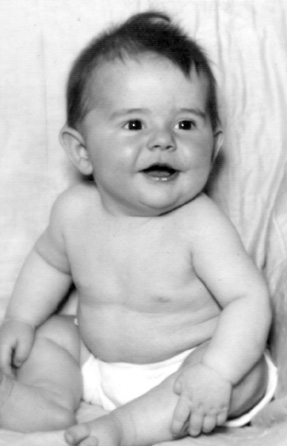
I was born
in the middle years of the Great Depression. It was years later that I
discovered what that meant. I was the first of four boys born to a blue
collar
family.
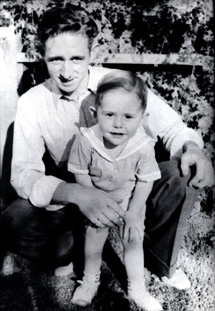 My
father
worked for the railroad in El Paso, Texas. He had an eighth grade
education and
was completing an apprenticeship as a machinist. He was skilled at
forming
metal with a lathe and milling machine. I can remember the smell of his
work.
It was the smell of oil in his clothes and the balls of ‘waste’ he used
to
clean his hands. Waste was the scraps from the cotton mills made up of
tangled
threads and scraps of cloth left from the looms and sewing machines in
the
factories. I remember staring at those mysterious balls of thread and
wondering
about the colors and how it was these threads were discarded before
they could
be shirts or dresses. What a waste. It was one of my early concepts.
My
father
worked for the railroad in El Paso, Texas. He had an eighth grade
education and
was completing an apprenticeship as a machinist. He was skilled at
forming
metal with a lathe and milling machine. I can remember the smell of his
work.
It was the smell of oil in his clothes and the balls of ‘waste’ he used
to
clean his hands. Waste was the scraps from the cotton mills made up of
tangled
threads and scraps of cloth left from the looms and sewing machines in
the
factories. I remember staring at those mysterious balls of thread and
wondering
about the colors and how it was these threads were discarded before
they could
be shirts or dresses. What a waste. It was one of my early concepts.
I remember
eating outside. There were picnics in open spaces and in the mountains,
made
possible by the fact that Dad only worked three days a week. Jobs were
so
scarce that workers would share a six-day-a-week job. It must have been
like
paradise to work three days and then have four days off. This was far
different
than I would experience later on with my own family. Later, Dad told me
what he
did. He cut up railroad cars and shipped them to Japan where the
Japanese made
weapons to make war on us. We would need that iron later to launch our
defenses
for World War II.
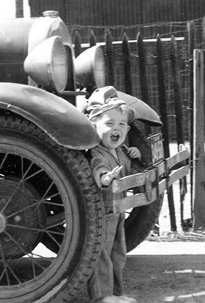 My
folks were very frugal. They took out a
mortgage and bought a house when I was about three. They bought a Model
A Ford
Coupe with a rumble seat; which I had fond memories of. I was allowed
to play
in and on the car and took great delight in driving it in my mind. A rumble
seat, for the benefit of anyone younger than I, was a compartment where
the
rear trunk is on a modern car that hinged from the bottom and revealed
an
outside bench seat for those passengers that did not fit in the front
seat.
There was a running board; which was a place to stand on the outside of
the
car, and footsteps up the back fender for climbing into the rumble
seat. A
Coupe could seat three adults that were not afraid to touch one another
or two
adults and one squirming kid. The rumble seat was only useful in dry
weather;
which was most of the time in El Paso. There were one or two spare
tires. One
spare tire was kept in an open well of the front fender and the other
hung on
the back of the rumble seat. The reason I was safe playing in the car
was that
it had to be cranked to start it and that took a very strong man like
my
father.
My
folks were very frugal. They took out a
mortgage and bought a house when I was about three. They bought a Model
A Ford
Coupe with a rumble seat; which I had fond memories of. I was allowed
to play
in and on the car and took great delight in driving it in my mind. A rumble
seat, for the benefit of anyone younger than I, was a compartment where
the
rear trunk is on a modern car that hinged from the bottom and revealed
an
outside bench seat for those passengers that did not fit in the front
seat.
There was a running board; which was a place to stand on the outside of
the
car, and footsteps up the back fender for climbing into the rumble
seat. A
Coupe could seat three adults that were not afraid to touch one another
or two
adults and one squirming kid. The rumble seat was only useful in dry
weather;
which was most of the time in El Paso. There were one or two spare
tires. One
spare tire was kept in an open well of the front fender and the other
hung on
the back of the rumble seat. The reason I was safe playing in the car
was that
it had to be cranked to start it and that took a very strong man like
my
father.
Life
changed on December 7, 1941. I was six and in kindergarten; and a radio
was
brought into the room so we could hear President Roosevelt. Radio was a
big
part of life at that time. Everything stopped and we paid attention
when the
radio was on. This time the teachers were very serious and we tried
hard to
understand about Pearl Harbor and the Japanese. I had heard H. V.
Kaltinborn
talk on the radio about the Germans in Poland but I didn’t understand
how it
affected us. My world was very small then and I didn’t understand about
nationalities or any place but El Paso. From that point onward my
education was
controlled by the events of the world.
I was
signed up for violin lessons and had taken several lessons from a stern
man
with a bald head. My dad and grandfather had lots of hair so I would
notice
that. After a few lessons I was introduced to a big room full of kids
playing
all manner of instruments. The leader said, “Give me a G.” I didn’t
have a
clue. That day was the last time I saw the bald man. I asked my mother
what
happened to him and she just said, “He was a German.” There were no
more violin
lessons. Some things are not explainable to a young boy. I was
beginning a new
education.
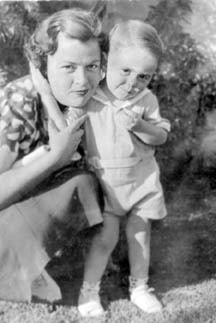 Fraternal
orders were big then. Mother had signed us up for the Woodmen of the
World. It
was like an insurance company. You paid your dues and had a small
insurance
policy in your name. You also went to a meeting hall and wore a cap
like a
soldier’s cap and marched to the music. A woman had a clapper made from
four
castanets on a stick and kept time even when there was no music. I
still
remember the marches, All American
Promenade, Over the
Waves and some Souza
marches that were played on a 78 rpm record player. We marched in
patterns of
columns and ranks and split and recombined the columns. In the movie, O Brother,
Where Art Thou? there was a scene where the Ku
Klux Klan marched before a flaming cross at
night. It was like that, only done by women and children in a big hall.
Fraternal
orders were big then. Mother had signed us up for the Woodmen of the
World. It
was like an insurance company. You paid your dues and had a small
insurance
policy in your name. You also went to a meeting hall and wore a cap
like a
soldier’s cap and marched to the music. A woman had a clapper made from
four
castanets on a stick and kept time even when there was no music. I
still
remember the marches, All American
Promenade, Over the
Waves and some Souza
marches that were played on a 78 rpm record player. We marched in
patterns of
columns and ranks and split and recombined the columns. In the movie, O Brother,
Where Art Thou? there was a scene where the Ku
Klux Klan marched before a flaming cross at
night. It was like that, only done by women and children in a big hall.
I had other
influences at that time. My mother was a Mormon, descended from
pioneers who
crossed the western plains to Utah and on to Arizona. My father was not
a
member but I attended Church and Sunday school on Sunday, and Primary
on
Tuesday after school. I learned to give short talks to my peers and had
a
circle of friends there that did not necessarily correspond to the
friends in
my neighborhood or at school. Mormons were a very small subset of the
El Paso
community and so I had very compartmentalized sets of friends.
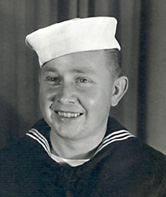
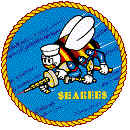 My Uncle
Fred had just married and was the age to go into the military. When you
were
called then it could have been to any branch of the service. It would
seem
unlikely that anyone from El Paso would be called into the Navy.
Ninety-nine
percent of young men in El Paso have never seen any body of water
larger than
the pool at the Y, much less an ocean. Nevertheless, Uncle Fred became
a Seabee
or, as the name suggested, a member of a Construction Battalion, C-B.
His
specialty was refrigeration and that would become his occupation for
the rest
of his life. His location would be secret. There were lots of secrets
about the
war. “Sh! Loose Lips Sink Ships” was the motto. The family wanted to
know where
he was going so they assumed the Pacific region and made up girls names
for
every island they could think of. So when he asked about someone not in
the
family we would have a clue where he was. When he wrote about something
between
two strange girls we suspected it was Midway Island; which was one of
the islands
that did not get a name. Now we could listen to the news with some
understanding of his risk.
My Uncle
Fred had just married and was the age to go into the military. When you
were
called then it could have been to any branch of the service. It would
seem
unlikely that anyone from El Paso would be called into the Navy.
Ninety-nine
percent of young men in El Paso have never seen any body of water
larger than
the pool at the Y, much less an ocean. Nevertheless, Uncle Fred became
a Seabee
or, as the name suggested, a member of a Construction Battalion, C-B.
His
specialty was refrigeration and that would become his occupation for
the rest
of his life. His location would be secret. There were lots of secrets
about the
war. “Sh! Loose Lips Sink Ships” was the motto. The family wanted to
know where
he was going so they assumed the Pacific region and made up girls names
for
every island they could think of. So when he asked about someone not in
the
family we would have a clue where he was. When he wrote about something
between
two strange girls we suspected it was Midway Island; which was one of
the islands
that did not get a name. Now we could listen to the news with some
understanding of his risk.
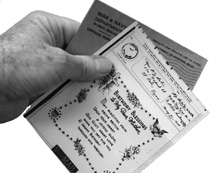 Things
were
getting scarce and even postal letters were involved. The government
invented
V-mail. Now you know how email became instantly accepted as a moniker
for the
new technology. The V stood for victory and became attached to
everything to
remind us of our priorities. V-mail was a method for taking hundreds of
pounds
of precious cargo space and compacting it on a roll of microfilm for
the trip
and printing it out at the destination for distribution. Everyone wrote
a one
page message on a large sheet of paper which was sorted and filmed for
each
destination and then printed half size before delivery at the other
end. If
both parties wrote every day then both parties might receive mail in
batches of
14 every two weeks. I think everyone including the censors read
everything
several times and pretty soon the same jokes would show up all over the
place
in V-mail. The address and the message were on the same side of the
paper like
a postcard, so anyone that handled it could see it. The little teeny
envelope
was not used until it was at its destination. You could buy preprinted
greeting
cards on V-mail blanks so all the person had to do was address it. Some
people
drew pictures and cartoons. That’s when we learned about Kilroy, the
little guy
peeking over the fence. ‘Kilroy was Here’ began popping up all over the
place.
Before that, the only universal graffiti I could remember was a
stenciled sign
spray painted on every building, alley, and wall where cars would be
that said,
‘Watch the Fords go by’. The words go and by were very close to each
other and
I assumed ‘goby’ was a word I had not learned yet. Of course the word
Ford was
in the trademark font on the radiator caps of all Fords at the time.
Ford got a
lot of cheap advertising in those years. The only other thing that came
close
was the Burma Shave signs along the road set out as a rhyming series of
clever
signs to break up the monotony of a long drive. Here is an example: Henry The
Eighth - Sure Had Troubles - Short On Wives - Long On Stubble! -
Burma Shave.
Things
were
getting scarce and even postal letters were involved. The government
invented
V-mail. Now you know how email became instantly accepted as a moniker
for the
new technology. The V stood for victory and became attached to
everything to
remind us of our priorities. V-mail was a method for taking hundreds of
pounds
of precious cargo space and compacting it on a roll of microfilm for
the trip
and printing it out at the destination for distribution. Everyone wrote
a one
page message on a large sheet of paper which was sorted and filmed for
each
destination and then printed half size before delivery at the other
end. If
both parties wrote every day then both parties might receive mail in
batches of
14 every two weeks. I think everyone including the censors read
everything
several times and pretty soon the same jokes would show up all over the
place
in V-mail. The address and the message were on the same side of the
paper like
a postcard, so anyone that handled it could see it. The little teeny
envelope
was not used until it was at its destination. You could buy preprinted
greeting
cards on V-mail blanks so all the person had to do was address it. Some
people
drew pictures and cartoons. That’s when we learned about Kilroy, the
little guy
peeking over the fence. ‘Kilroy was Here’ began popping up all over the
place.
Before that, the only universal graffiti I could remember was a
stenciled sign
spray painted on every building, alley, and wall where cars would be
that said,
‘Watch the Fords go by’. The words go and by were very close to each
other and
I assumed ‘goby’ was a word I had not learned yet. Of course the word
Ford was
in the trademark font on the radiator caps of all Fords at the time.
Ford got a
lot of cheap advertising in those years. The only other thing that came
close
was the Burma Shave signs along the road set out as a rhyming series of
clever
signs to break up the monotony of a long drive. Here is an example: Henry The
Eighth - Sure Had Troubles - Short On Wives - Long On Stubble! -
Burma Shave.
I think
some people may have made up their own versions. Some of the signs did
not end
with Burma Shave. That was the clue. Even when it was missing, you
would just
say ‘Burma Shave’ to yourself. Before billboards there were barns. An
unpainted
barn could last a little longer with a tobacco or snuff ad painted on
the side.
I had an
early experience on what it was to be a boy. My mother became concerned
that I
would not learn to keep my foreskin clean and explained that she
thought it
ought to be cut off. The thought horrified me. I was becoming aware
that those
were my private parts and didn’t want anyone messing around in that
area. I was
five and having problems with sore throats so it was decided that I
would have
my tonsils out. And my adenoids. And maybe the foreskin thing. I was
worried. I
requested just the tonsils and adenoids, please, and promise you won’t
touch
anything else. I was confident when they put the ether cup over my face
that I
was safe. The anesthesia was a real thrill. I remember seeing a great
fireworks
show and hearing heavenly music like the Mormon Tabernacle Choir
hitting a
major chord. Years later I would discover the joys of nitrous oxide and
remember the same feeling. It was happy going in.
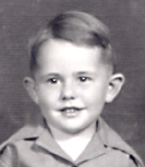 I
was
betrayed! When I woke up I had pain at both ends. I had been
circumcised
against my will. I was not impressed by the Jell-O and ice cream that
was
promised to ease my throat. I had been violated and amputated and I
didn’t know
what residual damage existed or how long it would take to stop hurting.
How was
I going to pee? The indignity of having a bandage at my crotch and
having to be
attended at every urination was devastating. The whole world knew. It
might
have been okay to have stayed in the house, but I had to go out in the
car to
visit my mother’s friends. I think I kept my eyes shut all the time. I
eventually healed. To a five-year-old it seemed like a whole lifetime.
Eventually I would come to accept the new shape and show it off to
anyone who
seemed interested. And that became a problem.
I
was
betrayed! When I woke up I had pain at both ends. I had been
circumcised
against my will. I was not impressed by the Jell-O and ice cream that
was
promised to ease my throat. I had been violated and amputated and I
didn’t know
what residual damage existed or how long it would take to stop hurting.
How was
I going to pee? The indignity of having a bandage at my crotch and
having to be
attended at every urination was devastating. The whole world knew. It
might
have been okay to have stayed in the house, but I had to go out in the
car to
visit my mother’s friends. I think I kept my eyes shut all the time. I
eventually healed. To a five-year-old it seemed like a whole lifetime.
Eventually I would come to accept the new shape and show it off to
anyone who
seemed interested. And that became a problem.
I think I
must have been born with the knowledge of sex. It became important to
learn
some new nouns and verbs to become proficient in the subject and these
were
supplied by some older boys in the neighborhood. For some reason my
parents did
not seem willing to facilitate my education in this area and would
respond with
definitions of nice boys and warnings of being shunned by nice people.
So, it
became a secret compartment in my mind. I thought about it all the
time. It
became the foundation for guilt. I learned not to say certain words. I
was
worried that even if I said them privately they would be so easy to say
that
they would just pop out of my mouth at the wrong time. I did try them
out on a
typewriter in the house to see how they worked in correspondence. I
boasted to
an imaginary friend of my conquests and accomplishments. They looked
kind of
exciting on paper but I was careless and the wrong person saw them. I
wouldn’t
make that mistake again. It also curtailed my literary development
since I was
not allowed to touch the typewriter again until I was in high school.
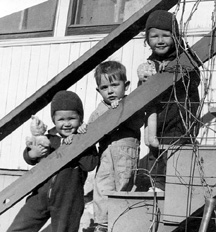 I
knew
about girls, too. Our next-door neighbors had twin girls born four days
after
me. Birth mothers stayed in the hospital for about a week in those days
and the
twins did not have enough milk from their own mother so volunteers were
asked
to express milk and donate to the cause. So, we were not bosom buddies
but we
started out on the same mother’s milk. I did have bath tub experiences
with the
twins and knew their genitals did not resemble mine at all; which
became a
fascination. By the time I was five I had figured all about sex. I had
a very
startling dream in which I saw up one of the twins dress and there were
genitals just like mine. That dream stayed etched in my mind for the
rest of my
life. A few years later, I had a dream where Porky Pig was standing
behind me
in the grocery store and it gave me some comfort that dreams did not
necessarily express reality. Many years later I would question the
fuzziness of
reality. Thirty five years later I would meet Mel Blanc face to face
and he
would talk like Porky Pig and that time it was real.
I
knew
about girls, too. Our next-door neighbors had twin girls born four days
after
me. Birth mothers stayed in the hospital for about a week in those days
and the
twins did not have enough milk from their own mother so volunteers were
asked
to express milk and donate to the cause. So, we were not bosom buddies
but we
started out on the same mother’s milk. I did have bath tub experiences
with the
twins and knew their genitals did not resemble mine at all; which
became a
fascination. By the time I was five I had figured all about sex. I had
a very
startling dream in which I saw up one of the twins dress and there were
genitals just like mine. That dream stayed etched in my mind for the
rest of my
life. A few years later, I had a dream where Porky Pig was standing
behind me
in the grocery store and it gave me some comfort that dreams did not
necessarily express reality. Many years later I would question the
fuzziness of
reality. Thirty five years later I would meet Mel Blanc face to face
and he
would talk like Porky Pig and that time it was real.
Thoughts of
war were everywhere. Movies were a very important common experience for
Americans. Movies were cheap and were the source of our wartime
propaganda. We
always started with the national anthem and newsreels along with the
movie and
cartoon and serialized superhero short. It didn’t take long to
incorporate
Hitler, Mussolini, and Tojo into the animated cartoons. They were
clowns to be
humiliated by the likes of Popeye and Daffy Duck. Cartoon dogfights
took place
to illustrate how the USA could whip those Japs; and the kids would
cheer. WW2
was a very popular war.
We saved
everything for defense; balls of string, balls of tinfoil (there was no
aluminum foil), and even grease from cooking. Anything could be used to
make
weapons. When word got out that spider webs were being used to make
crosshairs
for bombsights, we almost collected cobwebs but could not find anywhere
to take
them.
I saved my
pennies to buy airplane spotter manuals. Next to a Boy Scout manual,
there
couldn’t be a more valuable reference book. I really needed to know the
good
guys from the bad. Who knows when a Japanese Zero would fly over El
Paso? They
flew over Honolulu, didn’t they? It was then that Mitsubishi came into
my
vocabulary. For many years, most Japanese manufacturers chose an alias
for
their company name like Panasonic for Matsuchita.
Rationing
was very prevalent, starting with gasoline and going on to sugar, meat,
coffee,
and butter. It became more important than money. People were robbed for
their
ration books and they felt devastated beyond any monetary loss. After
all, you
can get more money. The books were about 2 by 5 inches and about ten
pages at a
time. Each page had perforated panels like stamps with symbols of
tanks, guns,
and airplanes on each stamp. The stamps would expire so you had to use
them in
the time period that they were valid. The stores would have a sign
indicating
which stamps were valid. If you didn’t actually buy the food in the
time period
it was too bad. Short-term cash problems could cause a great
inconvenience and
you could not easily plan ahead because sometimes the stamps were used
in a
random manner. It was illegal to sell stamps. Butchers could sell a
single
piece of baloney and so he had to also make change for the ration
stamp. This
was in the form of red and blue tokens; which did not expire. Using too
many
tokens raised eyebrows and you might be considered unpatriotic to be
guilty of
hoarding your privileges. Then margarine became popular. To make sure
no one
was counterfeiting butter, the only margarine you could buy was pure
white and
also contained a color envelope so you could dye it yellow after you
got home.
Being caught transporting colored margarine was a very serious crime.
Some
families, like mine, learned to eat white margarine because it was more
convenient. You had to soften it, color it and re-refrigerate it before
eating,
otherwise.
Sugar was
in short supply and so home canning became a problem. We were fortunate
that we
lived on the Mexican border. I can remember going across the bridge to
Juarez
to buy sugar. We had to park on the US side and walk to the store, then
return
carrying a five-pound bag for each person in the group. When the
customs
inspector came around to check our haul, there had to be a warm body to
represent each bag of sugar we had. I think there was a period of time
involved
or maybe the custom agent took a ration stamp. Anyway, sugar was a
scarce item,
so they invented saccharine and lots of people used it, but didn’t
really like
it. If you said someone was saccharine, it wasn’t a compliment; it
meant phony,
not sweet. Coffee was not a big problem for our family, but something
we took
advantage of it in the Mexican market. It could be traded or we could
use it
for our friends who drank it. It is a curious thing that we could go to
a poor
country to get luxury items in wartime. Could it be that scarcity of
goods is
more related to team building than inability to provide? There goes my
fuzzy
reality again.
You hear
stories about ladies stockings and how women learned to mend them using
tiny
hooks to loop around the runs. My mother bought one. I have seen women
taking
their stockings to Kress’s department store to be mended while they
waited. The
women wanted to wait for fear they would never see their stockings
again, so
they were willing to stand in lines. Standing in lines seemed to be the
only
solution for a lot of things.
Later, when
the war ended, I became aware of who had to stand in lines and why.
People
stand in lines for entertainment and sports and seem to have a good
time of it;
but to have to stand in line for the necessities is inhumane. I always
felt
sorry for the East Europeans and Soviets for their grim queues and for
their
interpersonal conflict in line. It is a symbol of the good life to
never have
to stand in line for necessities.
One of the
things that happened at a tender age that affected me all my life
concerned
Christmas. I had expressed a desire to have a 16 mm movie film
projector and
was told that it was not likely that such an expensive item would be
available.
Some time later it was noted that my father needed new underwear. The
night
before Christmas Eve we all went downtown and drove around the block
while my
mother went in to a department store. She came out with a package that
went
into the trunk and the comment was made about getting underwear for
Dad. On
Christmas morning I got my projector but there was no underwear for
Dad. I
learned something about Christmas that year about Santa and sacrifice,
but
mostly about guilt. I still get angry about the commercialization of
such a
serious commemorative. As I learned Latin and Roman History and learned
about
the hijacking of the Christian faith and traditions, it just added to
my
dissatisfaction of our current practices. How do we expect children to
accept
the seriousness of the atonement of Jesus Christ when we fill their
heads with
Santa, flying reindeer, Easter bunnies, and other lies?


